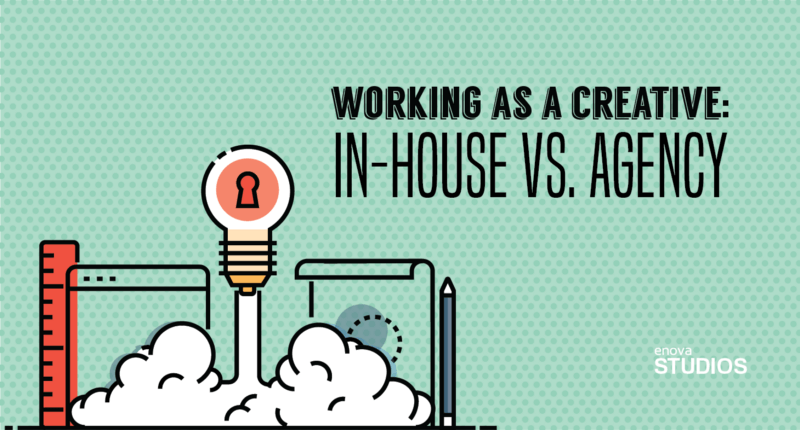5 Ways Working In-House Differs From Working at an Agency

By: Eddie Rybarski, Enova Studios Copywriter
Many people are familiar with the advertising agency version of a creative team. Agency-produced work is ubiquitous in our society, and the jobs of those who create it are popularized in media, such as in the show Mad Men. Fewer people are as familiar with the in-house version of a creative team. Plenty don’t even realize such jobs exist. Those who work those jobs, however, often find them more rewarding than agency work. Let’s break down how the two compare.
1. Access to Decision Makers
One of the main differences between working in-house and working at an agency is the relationship you have with your clients/stakeholders. At an agency, you are often viewed as an external member of the team rather than an actual member of the team. Therefore, the trust and rapport you have with the people you are creating work for is stronger in-house. This makes it easier to influence projects, push new ideas forward and have an overall greater impact on the brand.
2. Culture and Environment
As advertising agencies strive to be hotbeds for creativity, the workspace environments tend to reflect that. Amenities like video game consoles, ping-pong and foosball tables and refrigerators full of food and beer are common. For many in-house jobs, the environment is more likely to be corporate than it is creative. Of course, this also depends entirely on what type of company you are working in-house for. If it is a tech company or a startup, the workplace environment is often comparable to many agency/creative environments.
3. Work/Life Balance
Perhaps the most discussed way agency and in-house teams differ is in their work/life balance. Agencies are well known for being demanding on your time. Even in situations where your time isn’t demanded, it’s generally expected. All-nighters aren’t uncommon under tight deadlines, and working on the weekends isn’t either. In-house creative teams provide a much better work/life balance. Part of this is just inherent in the culture of the companies involved, but a lot of it has to do with in-house teams not having the pressure of constantly competing for a client’s business.
4. Speed/Workflow
At an agency, client approval can take much longer than when you’re working in-house. There are often more levels of approval for work to go through, which can delay launch dates and project deadlines. In-house, the ease of communication and routine workflow allow for projects to receive approval from stakeholders quickly and easily. Increased levels of communication and familiarity can lead to delivering results that almost always meet or exceed expectations without too much back and forth.
5. Brand and Product Expertise
One of the more obvious yet significant ways in-house creative teams differ from agency creative teams is what they work on. While some external agencies can somewhat specialize in a client’s business or a particular industry, they mostly do work for a wide variety of businesses. In-house agencies only work on the offerings of their own company. This can allow for the development of expertise in a certain area.
At Enova, the majority of our brands offer online financial products (such as short-term loans, installment loans and lines of credit). The experience the members of our creative team have working on these brands has allowed us to attain a certain level of expertise in the online financial services/fintech space. This expertise is valuable, not only for our company, but also for our employees.
As you can see, there are a number of differences between working in-house and working at an agency. While creative teams are similar in the type of work they do, not all creative professionals are similar in how they like to work or the type of company that brings out their best. It’s ultimately up to each individual to figure out the right fit!